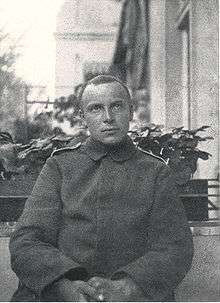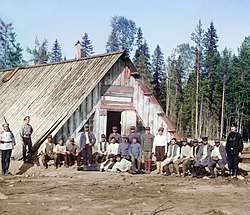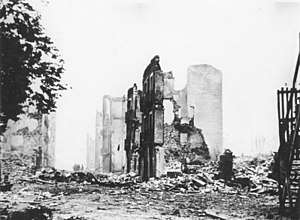War poet
A war poet is a poet who participates in a war and writes about their experiences, or a non-combatant who writes poems about war. While the term is applied especially to those who served during World War I,[1] the term can be applied to a poet of any nationality writing about any war, including Homer's Iliad, from around the 8th century BC, and the Old English poem The Battle of Maldon, which celebrated the actual Battle of Maldon in 991, as well as poetry of the American Civil War, the Spanish Civil War, the Crimean War and other wars.
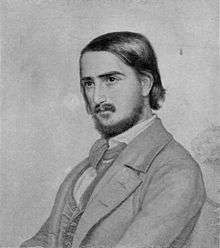
Jacobite Uprising of 1745
In the Scottish Gaelic language, the greatest war poet of the Jacobite Uprising of 1745 was Alasdair Mac Mhaighstir Alasdair, who served as a Captain of the Clanranald men from the raising of the Standard at Glenfinnan until the final defeat at the Battle of Culloden.
Other poems about the Uprising were written in both Gaelic and English by John Roy Stewart, who served as Colonel of the Edinburgh Regiment and a close and trusted confidant of Prince Charles Edward Stuart.
The Irish language poem Mo Ghile Mear, which was composed by the County Cork Bard Seán "Clárach" Mac Domhnaill, is a lament for the defeat of the Uprising at the Battle of Culloden. The poem is a soliloquy by the Kingdom of Ireland, whom Seán Clárach personifies as a woman. The woman laments her state and describes herself as a grieving widow due to the defeat and exile of her lawful King.
Poems about the Jacobite Uprising, have also been written in English by Sir Walter Scott, Carolina Nairne, Agnes Maxwell MacLeod, Allan Cunningham, and William Hamilton.
German Revolutions of 1848–49
Georg Herwegh who wrote during the German revolutions of 1848–49 is an example of a 19th century German war poet.[2][3]
Crimean War
Probably the most famous 19th century war poem is Tennyson's "The Charge of the Light Brigade", which he supposedly wrote in only a few minutes after reading an account of the battle in The Times. As poet laureate he often wrote verses about public events. It immediately became hugely popular, even reaching the troops in the Crimea, where it was distributed in pamphlet form.[4]
Rudyard Kipling's poem "The Last of the Light Brigade", written some forty years after the appearance of "The Charge of the Light Brigade", in 1891, focuses on the terrible hardships faced in old age by veterans of the Crimean War, as exemplified by the cavalry men of the Light Brigade, in an attempt to shame the British public into offering financial assistance.[5] Various lines from the poem are randomly quoted by Mr. Ramsay in Virginia Woolf's To The Lighthouse.
American Civil War
As the American Civil War was beginning, American poet Walt Whitman published his poem "Beat! Beat! Drums!" as a patriotic rally call for the North.[6] Whitman volunteered for a time as a nurse in the army hospitals,[7] and his collection Drum-Taps (1865) deals with his experiences during the War.
Novelist Herman Melville also wrote many poems about the war which support the Union side.
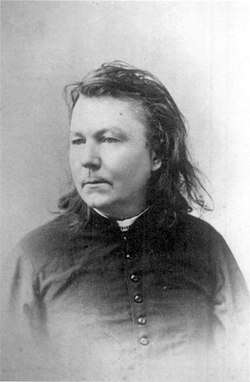
On the Confederate side, the most well known Civil War poet is Father Abram Ryan, a Roman Catholic priest and former military chaplain to the Confederate Army. Father Ryan, who eulogized the defeated South in poems like The Conquered Banner and The Sword of Lee, is sometimes referred to as "The Poet-Priest of the Confederacy," and as "The Poet Laureate of the South."
Boer War
Rudyard Kipling wrote poetry in support of the British cause in the Boer War,[8] including the well known "Lichtenberg", which is about a combatant's death in a foreign land.[9] Swinburne, Thomas Hardy, and others wrote also poems relating to the Boer War. Hardy's poems include "Drummer Hodge",and "The Man He Killed". '"Swinburne regularly donated work to the papers to rouse the spirit, from 'Transvaal', with the infamous closing line, 'Strike, England, and strike home', to 'The Turning of the Tide'."[10]
"But ranged as infantry,
And staring face to face,
I shot at him as he at me,
And killed him in his place.
"I shot him dead because —
Because he was my foe,
Just so: my foe of course he was;
That's clear enough; although
"He thought he'd 'list, perhaps,
Off-hand like — just as I —
Was out of work — had sold his traps —
No other reason why.
"Yes; quaint and curious war is!
You shoot a fellow down
You'd treat if met where any bar is,
Or help to half-a-crown."
Thomas Hardy's Boer War poem "The Man He Killed" (1909).[11]
World War I
In a 2020 article for the St Austin Review about American WWI poet John Allan Wyeth, Dana Gioia writes, "The First World War changed European literature forever. The horror of modern mechanized warfare and the slaughter of nineteen million young men and innocent civilians traumatized the European imagination. For poets, the unprecedented scale of violence annihilated the classic traditions of war literature -- individual heroism, military glory, and virtuous leadership. Writers struggled for a new idiom commensurate with their apocalyptic personal experience. European Modernism emerged from the trenches of the Western Front.
"British poetry especially was transformed by the trauma of trench warfare and indiscriminate massacre. The 'War Poets' constitute an imperative presence in modern British literature with significant writers such as Wilfred Owen, Robert Graves, Siegfried Sassoon, David Jones, Ivor Gurney, Rupert Brooke, Edward Thomas, and Isaac Rosenberg. Their work, which combined stark realism and bitter irony with a sense of tragic futility, altered the history of English literature.
"Similar cohorts of war poets occupy important positions in other European literature's. French literature has Charles Peguy, Guillaume Apollinaire, and Blaise Cendrars (who lost his right arm at the Second Battle of Champagne). Italian poetry has Eugenio Montale, Giuseppe Ungaretti, and Gabriele D'Annunzio. German poetry has Georg Trakl, August Stramm, and Gottfried Behn.
"These scarred survivors reshaped the sensibility of modern verse. The Great War also changed literature in another brutal way; it killed countless young writers."[12]
England
The major novelist and poet Thomas Hardy (1840 – 1928) wrote a number of significant war poems that relate to the Napoleonic Wars, the Boer Wars and World War I, including "Drummer Hodge", "In Time of 'The Breaking of Nations'", and "The Man He Killed"; his work had a profound influence on other war poets such as Rupert Brooke and Siegfried Sassoon".[13] Hardy in these poems often used the viewpoint of ordinary soldiers and their colloquial speech.[13] A theme in the Wessex Poems (1898) is the long shadow that the Napoleonic Wars cast over the 19th century, as seen, for example, in "The Sergeant's Song" and "Leipzig". The Napoleonic War is the subject of Hardy's drama in verse The Dynasts (1904–08).[14]
At the beginning of World War I, like many other writers, Kipling wrote pamphlets and poems which enthusiastically supported the UK's war aims of restoring Belgium after that kingdom had been occupied by Germany together with more generalised statements that Britain was standing up for the cause of good.[15]
.jpg)
For the first time, a substantial number of important British poets were soldiers, writing about their experiences of war. A number of them died on the battlefield, most famously Edward Thomas, Isaac Rosenberg, Wilfred Owen, and Charles Sorley. Others including Robert Graves,[16] Ivor Gurney and Siegfried Sassoon survived but were scarred by their experiences, and this was reflected in their poetry. Robert H. Ross describes the British "war poets" as Georgian poets.[17] Many poems by British war poets were published in newspapers and then collected in anthologies. Several of these early anthologies were published during the war and were very popular, though the tone of the poetry changed as the war progressed. One of the wartime anthologies, The Muse in Arms, was published in 1917, and several were published in the years following the war.
David Jones' epic poem of World War I In Parenthesis was first published in England in 1937, and is based on Jones's own experience as an infantryman in the War. In Parenthesis narrates the experiences of English Private John Ball in a mixed English-Welsh regiment starting with their leaving England and ending seven months later with the assault on Mametz Wood during the Battle of the Somme. The work employs a mixture of lyrical verse and prose, is highly allusive, and ranges in tone from formal to Cockney colloquial and military slang. The poem won the Hawthornden Prize and the admiration of writers such as W. B. Yeats and T. S. Eliot.[18]
In November 1985, a slate memorial was unveiled in Poet's Corner commemorating 16 poets of the Great War: Richard Aldington, Laurence Binyon, Edmund Blunden, Rupert Brooke, Wilfrid Gibson, Robert Graves, Julian Grenfell, Ivor Gurney, David Jones, Robert Nichols, Wilfred Owen, Herbert Read, Isaac Rosenberg, Siegfried Sassoon, Charles Sorley and Edward Thomas.[19]
Scotland
_cropped_and_retouched.jpg)
When the war began, Scottish poet Charles Sorley, a native of Aberdeen, was living in Imperial Germany and attending the University of Jena. He later recalled that when the war began, his first feelings of patriotism were towards Germany. After being briefly interned at Trier and ordered to leave the country, Sorley returned to Great Britain and enlisted in the Suffolk Regiment as a Lieutenant. He was killed by a German sniper during the Battle of Loos in 1915 and his poems and letters were published posthumously.
Robert Graves described Charles Sorley in Goodbye to All That as "one of the three poets of importance killed during the war". (The other two being Isaac Rosenberg and Wilfred Owen.) Sorley believed that Germans and British were equally blind to each other's humanity and his anti-war poetry stands in direct contrast to the jingoistic nationalism of Rupert Brooke.
The poet John Munro, a native of Swordale on the Isle of Lewis, won the Military Cross while serving as a 2nd Lieutenant with the Seaforth Highlanders and was ultimately killed in action during the 1918 Spring Offensive. Lt. Munro, writing in his native Gaelic as Iain Rothach, came to be ranked by critics alongside the major war poets. Tragically, only three of his poems are known to survive. They are Ar Tir ("Our Land"), Ar Gaisgich a Thuit sna Blàir ("Our Heroes Who Fell in Battle"), and Air sgàth nan sonn ("For the Sake of the Warriors").[20] Derick Thomson - the venerable poet and Professor of Celtic Studies at Glasgow - hailed Munro's work in his Companion to Gaelic Scotland as being: "the first strong voice of the new Gaelic verse of the 20th century".
Pàdraig Moireasdan, a Scottish Gaelic bard and seanchaidh from Grimsay, North Uist, served in the Lovat Scouts during World War I. He served in the Gallipoli Campaign, in the Macedonian front, and on the Western Front. In later years, Moireasdan, who ultimately reached the rank of Corporal, loved to tell how he fed countless starving Allied soldiers in Thessalonica by making a quern. Corporal Moireasdan composed many poems and songs during the war, including Òran don Chogadh (A Song to the War"), which he composed while serving at Gallipoli.[21]
In 1969, Gairm posthumously published the first book of poems by Dòmhnall Ruadh Chorùna, a combat veteran of the King's Own Cameron Highlanders during World War I and war poet in the Scottish Gaelic language. Unlike Wilfred Owen and Siegfried Sassoon, Dòmhnall Ruadh believed himself to be fighting a just war against a terrible enemy. His anger over the futility of the war only boiled over after he returned to his home in North Uist, in the Outer Hebrides, and found that none of the promises that had been made to soldiers from the Scottish Highlands and Islands were going to be kept. The rents were still high, the population was still impoverished, hunting and fishing were still prosecuted as poaching, and the omnipotence of the island's Anglo-Scottish landlord was exactly as it had been before the war began.
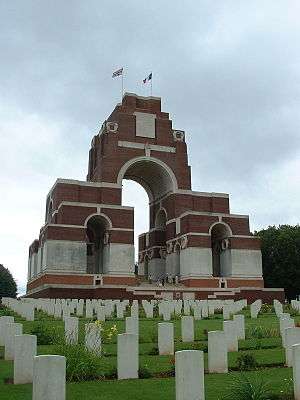
Dòmhnall Ruadh's poetry book proved very popular and began being used to teach the Gaelic language in the schools of the Scottish Highlands and Islands. An expanded and bilingual edition was published by the Historical Society of North Uist in 1995. In 2016, Scottish folk singer and North Uist native Julie Fowlis performed Dòmhnall Ruadh's wartime love song An Eala Bhàn ("The White Swan") at the Thiepval Memorial on the hundredth anniversary of the Battle of the Somme. Three senior members of the British Royal Family, Prince William, Catherine, Duchess of Cambridge, and Prince Harry were in attendance.
Wales
At the outbreak of World War I, militarism was seen in Wales as a very English trait. Throughout the war, voluntary enlistments remained very low and conscription was ultimately enacted to forcibly bring the Welsh people into the British armed forces.
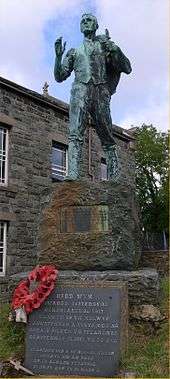
The most famous Welsh language war poet remains Private Ellis Humphrey Evans of the Royal Welch Fusiliers, who is best known under his bardic name of Hedd Wyn. Hedd Wyn was killed by shrapnel from a German shell during his battalion's assault on Pilckem Ridge during the first day of the Battle of Passchendaele in 1917. Just a few weeks later, he was posthumously awarded the Chair at the National Eisteddfod of Wales. The Bardic Chair was delivered to the farmhouse of the Bard's parents draped in a black sheet.
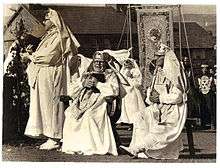
Another great Welsh language war poet was Rev. Albert Evans-Jones, who served on the Salonica front and on the Western Front as a RAMC ambulance man and later as a military chaplain. After the war, he became a minister for the Presbyterian Church of Wales and wrote many poems that shocked the Welsh population with their graphic descriptions of the horrors of the trenches and their savage attacks on wartime ultra-nationalism. Rev. Evans-Jones, whom Alan Llwyd considers the greatest Welsh poet of the Great War, is best known under the bardic name of Cynan.
Welsh poet Alan Llwyd's English translations of many poems by both poets appear in the volume Out of the Fire of Hell; Welsh Experience of the Great War 1914-1918 in Prose and Verse.
United States
The United States only entered the Great War in May 1917. By that time, the mass mechanized slaughter at the Somme, Verdun, and Passchendaele, which still haunt the other combatant nations, had already taken place.
By the time large numbers of soldiers from the American Expeditionary Forces arrived in France, they faced an Imperial German Army that was starving, exhausted, and which had already been bled white by three years of war. Furthermore, the German people were being systematically starved by a Royal Navy blockade and were increasingly on the brink of Revolution. Although American Doughboys helped stem the 1918 Spring Offensive, won the Meuse-Argonne Campaign, and saved the Allies from having to contract a negotiated peace with the Central Powers, America's losses were far fewer than those of other nations. For this reason, World War I is a forgotten war in America today.
Although World War I in American literature is widely believed to begin and end with Ernest Hemingway's war novel A Farewell to Arms, there were also American war poets.
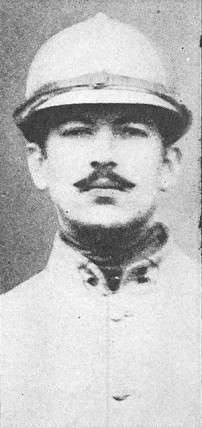
Alan Seeger, the uncle of Marxist folk singer Pete Seeger, enlisted in the French Foreign Legion while America was still neutral and became the first great American poet of the First World War. He was killed in action on July 4, 1916, during the French Army's attack against the trenches of the Imperial German Army at Belloy-en-Santerre, during the Battle of the Somme.[22] His fellow French Foreign Legion soldier, Rif Baer, later described Seeger's last moments: "His tall silhouette stood out on the green of the cornfield. He was the tallest man in his section. His head erect, and pride in his eye, I saw him running forward, with bayonet fixed. Soon he disappeared and that was the last time I saw my friend."[23][24] As he lay mortally wounded in no man's land, Seeger cheered on the passing soldiers of the Legion until he died of his injuries.[25]

Seeger's poems, which passionately urged America to join the Allied cause, had been widely publicized and his death was greeted with national mourning. Decades after his passing, Seeger's poem I Have a Rendezvous with Death was a great favorite of U.S. President John Fitzgerald Kennedy. Seeger is sometimes called, "The American Rupert Brooke."
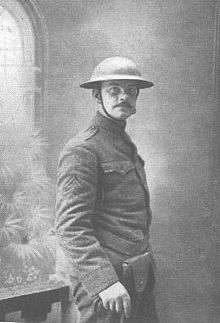
American poet and Roman Catholic convert Joyce Kilmer, who was widely considered America's answer to G.K. Chesterton, served in France as a Sergeant with the Fighting 69th. Sgt. Kilmer was beginning to write war poetry at the time that he was killed by a German sniper during the Second Battle of the Marne on July 30, 1918.
According to Dana Gioia, "None of Kilmer's wartime verses are read today; his reputation survives on poems written before he enlisted."[26]
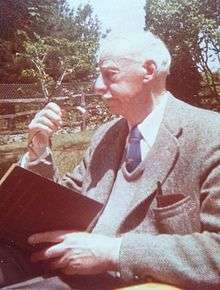
In 1928, American poet and World War I veteran John Allan Wyeth published This Man's Army: A War in Fifty-Odd Sonnets. The collection, which is written in an experimental form unique in the history of the sonnet, traces Wyeth's military service as a Lieutenant with the 33rd U.S. Infantry Division from the time he received orders to embark for France, during the ocean voyage and through his journey into the firing line. Although the collection was very well reviewed, the 1929 Stock Market Crash soon followed its publication and Wyeth's poetry was swiftly forgotten. When John Allan Wyeth died on May 11, 1981, his obituary made no mention of the fact that he had been a poet.
According to B.J. Ormanson and Dana Gioia, who rescued Wyeth's poetry from oblivion during the early 21st century, Wyeth is the only American poet of the First World War who can be compared with English war poets Siegfried Sassoon, Isaac Rosenberg, and Wilfred Owen. Ormanson has also found that every event that Wyeth relates in his sonnets, down to the way he describes the weather, can be verified by other sources as completely accurate.
In response to the 2008 re-publication of The Man's Army, British literary critic Jon Stallworthy, the editor of The Oxford Book of War Poetry and the biographer of Wilfred Owen, wrote, "At long last, marking the ninetieth anniversary of the Armistice, an American poet takes his place in the front rank of the War Poet's parade."[27]
Ireland
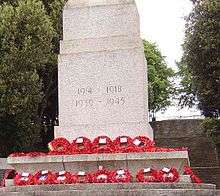
The involvement of Irish people in the British armed forces during World War I remains very controversial. This was because Ireland's struggle for Independence took place during the same era and Irishmen who fought for the Crown were seen as traitors. Nevertheless, there were also Irish war poets.
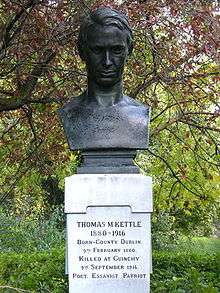
One of them, poet Tom Kettle, a former member of the Irish Volunteers and M.P. for the Irish Parliamentary Party, was, despite his sympathy for Occupied Belgium, very critical of the war at first. Comparing the Anglo-Irish landlord class with the big estate owners who similarly dominated the Kingdom of Prussia, Kettle wrote, "England goes to fight for liberty in Europe and for Junkerdom in Ireland."[28]
Later, when he was serving as a Lieutenant with the Royal Dublin Fusiliers on the Western Front, Kettle learned of the executions that followed the crushing of the Easter Rising of 1916. In response, Kettle wrote, "These men will go down in history as heroes and martyrs and I will go down - if I go down at all - as a bloody British officer."[29]
Kettle's best known poem is a sonnet, "To My Daughter Betty, the Gift of God", written just days before he was shot in the chest during the attack on Ginchy, during the Battle of the Somme. His body was never found. His last poem reads:
- "In wiser days, my darling rosebud, blown
- To beauty proud as was your mother's prime,
- In that desired, delayed, incredible time,
- You'll ask why I abandoned you, my own,
- And the dear heart that was your baby throne,
- To dice with death. And oh! they'll give you rhyme
- And reason: some will call the thing sublime,
- And some decry it in a knowing tone.
- So here, while the mad guns curse overhead,
- And tired men sigh with mud for couch and floor,
- Know that we fools, now with the foolish dead,
- Died not for flag, nor King, nor Emperor
- But for a dream, born in a herdsman's shed
- And for the secret Scripture of the poor."[30]
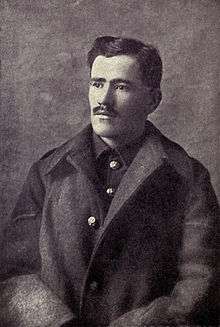
When Francis Ledwidge, who was a member of the Irish Volunteers, learned of the outbreak of the war, he decided against enlisting in the British Army. After being put on trial by the National Volunteers and accused of cowardice and of being Pro-German, Ledwidge enlisted in the Royal Inniskilling Fusiliers. He published three volumes of poetry between 1916–18, while he served at the Landing at Suvla Bay, on the Macedonian front and on the Western Front. Ledwidge expressed a belief in his poems and letters that he was fighting for Ireland rather than for the United Kingdom. Ultimately, Francis Ledwidge was "blown to bits" by a German shell while drinking tea in a shell hole on the first day of the Battle of Passchendaele in 1917. A monument to him, topped by the Irish tricolour, now stands on the site of his death. Ledwidge's work as "peasant poet" and "soldier poet", were once a standard part of the Irish school curriculum.[31]
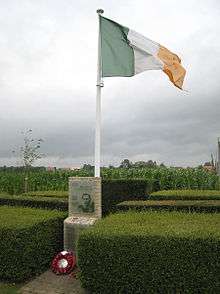
William Butler Yeats' first war poem was "On being asked for a War Poem" written on February 6, 1915 in response to a request from Henry James for a political poem about World War I.[32] Yeats changed the poem's title from "To a friend who has asked me to sign his manifesto to the neutral nations" to "A Reason for Keeping Silent" before sending it in a letter to James, which Yeats wrote at Coole Park on August 20, 1915.[33] When it was later reprinted the title was changed to "On being asked for a War Poem".[34]
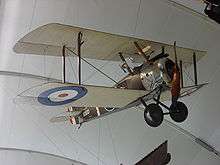
Yeats' most famous war poem is An Irish Airman Foresees His Death. The poem is a soliloquy by Major Robert Gregory, an Anglo-Irish flying ace, in which the narrator predicts his imminent death in an aerial dogfight. Maj. Gregory, who died when his Sopwith Camel crashed near Padua, Italy on January 23, 1918, was an Irish nationalist, a friend of Yeats, and the son of his patroness Lady Augusta Gregory. Royal Flying Corps records in the British National Archives state that Maj. Gregory was "shot down in error by an Italian pilot", a claim that has been repeated by both Yeats' and Lady Gregory's biographers. In 2017, Geoffrey O'Byrne White, a director of the Irish Aviation Authority, the great-grandnephew of Lady Gregory, and a former pilot in the Irish Air Corps, said he believed Major Gregory had become incapacitated at high altitude, attributing this to an inoculation that morning against influenza.[35]
In Yeats' poem, Maj. Gregory declares that he does not hate the German and Austro-Hungarian pilots he fights against or love the British Empire, which he defends. He comments that his countrymen are the poor Irish Catholic tenants of his mother's estate at Kiltartan, County Galway, that they will not mourn his death, and that his passing will have done nothing to improve their lives. He comments that he signed up to fight not for law, duty, the speeches of politicians, or the cheering crowds, but for, "a lonely impulse of delight."
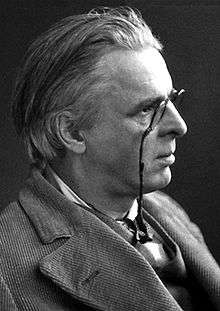
Wishing to show restraint from publishing a political poem during the height of the Great War, Yeats withheld publication of An Irish Airman Forsees His Death until after the 1918 Armistice.[36]
"The Second Coming" is a poem written by Irish poet W. B. Yeats in 1919, in the aftermath of the First World War[37] and at the beginning of the Irish War of Independence, which followed the Easter Rising of 1916, but before David Lloyd George and Winston Churchill sent the Black and Tans to Ireland.[38] The poem uses Christian imagery regarding the Apocalypse and the Second Coming to allegorise the state of Europe during the Interwar Period.[39]
Canada
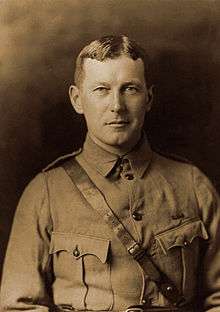
The most famous Canadian war poet of this period is John McCrae, who wrote the poem In Flanders Fields.
Robert W. Service, who worked as an ambulance driver for the Canadian Red Cross and was a war correspondent for the Canadian government, also published a volume of war poems.
Russia
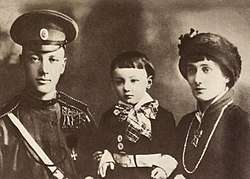
Russia also produced a number of significant war poets including Alexander Blok, Ilya Ehrenburg (who published war poems in his book "On the Eve"), and Nikolay Semenovich Tikhonov (who published the book Orda (The Horde) in 1922).[40]
The Acmeist poet Nikolay Gumilyov served in the Imperial Russian Army during World War I. He saw combat in East Prussia, the Macedonian front, and with the Russian Expeditionary Force in France. He was also decorated twice with the Cross of St. George. Gumilyov's war poems were assembled in the collection The Quiver (1916).
Gumilyov's wife, the poetess Anna Akhmatova, began writing poems during World War I that expressed the collective suffering of the Russian people as men were called up and the women in their lives bade them goodbye. For Akhmatova, writing such poems turned into her life's work and she continued writing similar poems about the suffering of the Russian people during the Bolshevik Revolution, the Russian Civil War, the Red Terror, and Joseph Stalin's Great Purge.
France
Amongst French World War I poets are the following: Guillaume Apollinaire, Adrien Bertrand, Yvan Goll, and Charles Péguy.
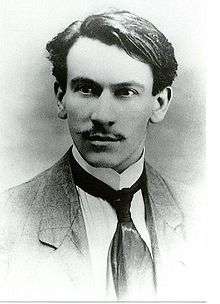
The French Symbolist poet Louis Pergaud considered himself a Pacifist and, at the outbreak of war in 1914, he tried in vain to register as a conscientious objector. Instead, he was conscripted into the French Army and sent to the trenches of the Western Front.
On 7 April 1915, Pergaud's regiment attacked the Imperial German Army's trenches near Fresnes-en-Woëvre, during which he was wounded. Pergaud fell into barbed wire, where he became trapped. Several hours later, German soldiers rescued him and other wounded French soldiers and took them to a temporary field hospital behind German lines. On the morning of April 8, 1915, Pergaud and many other POWs were killed by friendly fire, when a French artillery barrage destroyed the hospital.
The Breton language poet and activist Yann-Ber Kalloc'h, a former Catholic seminarian who was best known by his Bardic name of Bleimor, enlisted in the French Army on the outbreak of war in 1914. Like many others, Kalloc'h believed that France's war against Germany was a defense of civilization and Christianity and that it would lead to the resurrection of the Catholic Faith and the Breton language and culture. Ultimately, Kalloc'h, who wielded a sailor's axe in hand to hand combat in the trenches, was killed when a German shell landed near his dugout on April 10, 1917. His last poetry collection, Ar en Deulin, was published posthumously.
Germany
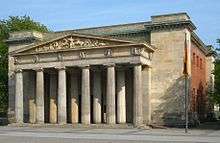
German World War I poets include: Rudolf G. Binding, Heinrich Mann, and August Stramm.
When the war broke out in 1914, Gerrit Engelke, a working class poet from Hanover, was in neutral Denmark. He at first hesitated to return, but was ultimately forced to do so by financial pressures. He served in combat for four years, experiencing the battles of Langemarck, St. Mihiel, the Somme, Dünaberg, and Verdun. In 1916, he was awarded the Iron Cross for swimming across the flooded Yser River. Engelke was wounded in 1917 and, during his recovery, he became engaged to a war widow, but was forced to return to combat in May 1918. His friends attempted to have him transferred away from the firing line, much to Engelke's outrage, as he felt a deep loyalty to his brothers in arms. He was fatally injured in a successful British assault on October 11, 1918 and died the following day at a British field hospital. He had previously written, "The greatest task which faces us after the war will be to forgive our enemy, who has, after all, been our neighbour on Earth since Creation."[41]
Gerrit Engelke is best known for his anti-war poem An die Soldaten Des Grossen Krieges ("To the Soldiers of the Great War"), a poem in rhymed dactylic hexameter modeled after the Neo-Classical odes of Friedrich Hölderlin. In the ode, Engelke urges the soldiers of all the combatant nations to join hands together in universal brotherhood. An English translation exists by Patrick Bridgwater.
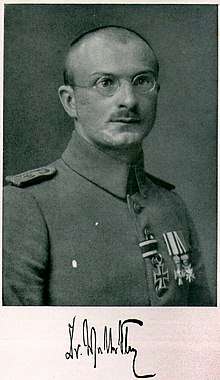
Walter Flex, who is best known as the author of the war poem Wildgänse rauschen durch die Nacht, was a native of Eisenach and attended the University of Erlangen before the outbreak of war. After service on both the Eastern and Western Fronts, Flex was killed in action at Saaremaa, Estonia during Operation Albion on October 17, 1917. His poems, which were very patriotic in nature, remained very popular until the 1970s.
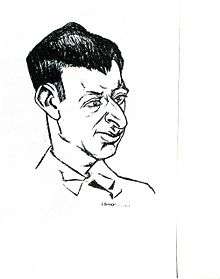
Yvan Goll, a Jewish poet from the disputed territory of Alsace-Lorraine, wrote bilingually in both German and French. At the outbreak of war in 1914, Goll fled to Switzerland to evade conscription into the Imperial German Army. While there, he wrote many anti-war poems, in which he sought to promote better understanding between Germany and France. His most famous poem is Requiem für die Todte in Europa (Requiem for the Dead of Europe).
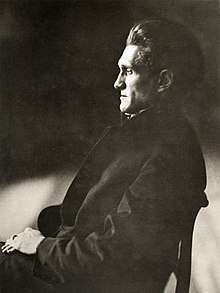
Stefan George, a German poet who had done his literary apprenticeship with the French Symbolist poets in Paris, still had many friends in France and viewed the Great War as disastrous. In his 1916 anti-war poem Der Krieg ("The War"), George attacked the horrors that soldiers of all nations were facing in the trenches. In the poem, George famously declared, "The ancient god of battles is no more."
Reinhard Sorge, the Kleist Prize winning author of the Expressionist play Der Bettler, saw the coming of the war as an idealistic recent convert to the Roman Catholic Church. He wrote many poems, many of them in experimental forms, about both his Catholic Faith and what he was witnessing as a soldier with the Imperial German Army in France. Shortly before being mortally wounded by a grenade during the Battle of the Somme, Sorge wrote to his wife expressing a belief that what he called, "the Anglo-French Offensive" was going to succeed in overrunning German defenses. Sorge died in a field hospital at Ablaincourt on July 20, 1916. Sorge's wife only learned of his death when a letter, in which she informed her husband that he had gotten her pregnant during his last furlough, was returned to her as undeliverable.
In 1920, German poet Anton Schnack, whom Patrick Bridgwater has dubbed, "one of the two unambiguously great," German poets of World War I and, "the only German language poet whose work can be compared with that of Wilfred Owen," published the sonnet sequence, Tier rang gewaltig mit Tier ("Beast Strove Mightily with Beast").[42]
Also according to Bridgwater, "The poems in Tier gewaltig mit Tier follow an apparently chronological course which suggests that Schnack served first in France and then in Italy. They trace the course of the war, as he experienced it, from departing for the front, through countless experiences to which few other German poets with the exception of Stramm have done justice in more than isolated poems, to retreat and the verge of defeat."[43]
The 60 sonnets that comprise Tier rang gewaltig mit Tier, "are dominated by themes of night and death."[44] Although his ABBACDDCEFGEFG rhyme scheme is typical of the sonnet form, Schnack also, "writes in the long line in free rhythms developed in Germany by Ernst Stadler."[45] Patrick Bridgwater, writing in 1985, called Tier rang gewaltig mit Tier, "without question the best single collection produced by a German war poet in 1914-18." Bridgwater adds, however, that Anton Schnack, "is to this day virtually unknown even in Germany."[46]
Austria-Hungary
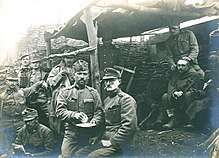
There were also war poets from the Austro-Hungarian Empire.
Franz Janowitz, a Jewish poet from the Kingdom of Bohemia, had enlisted in the Austro-Hungarian Army as a one year volunteer in 1913. He was wounded by machine gun fire during an assault on Monte Rombon and died of his wounds on November 4, 1917. According to Jeremy Adler, "Franz Janowitz conflicts with the received idea of the best German war poets. Neither realistic, nor ironic, nor properly expressionistic, while he excoriated the battlefield that the whole world had become, he still preserved a Faith in nobility, innocence, and song. Forced into maturity by the war, his poetic voice never lost a certain childlike note - indeed, in some of his best poems, naivety and wisdom coexist to an almost paradoxical degree. Such poetry was fired by a vision of a transcendental realm that lay beyond conflict, but never sought to exclude death. His 25 years, the last four of which were spent in the Army, scarcely left him time to develop a wholly independent voice, but his work displays an increasing mastery of form and deepening of vision. His small oeuvre consists of Novellen, essays, aphorisms, and a handful of the best German poems connected with the Great War."[47]
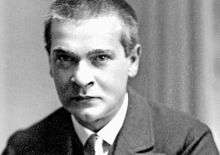
Georg Trakl, an Expressionist poet from Salzburg, enlisted in the Austro-Hungarian Army as a medical officer in 1914. He personally witnessed the Battle of Gródek, fought in the Kingdom of Galicia and Lodomeria, in which the Austro-Hungarian Army suffered a bloody defeat at the hands of the Imperial Russian Army. After the battle, Trakl was left in command of a field hospital filled with wounded soldiers and mentally collapsed from the ensuing strain.
One evening following the battle Trakl ran outside and attempted to shoot himself in order to escape from the screams of the wounded and the dying. He was prevented from doing so and was sent to a mental hospital. On the night of November 3-4, 1914, Georg Trakl died in a military hospital in Cracow from an overdose of cocaine. Trakl's batman, however, who was the last person to whom the poet spoke, believed that the overdose was an accident, rather than suicide.[48] Georg Trakl is best known for the poem Grodek.
Géza Gyóni, a Hungarian poet, enlisted in the Austro-Hungarian Army in 1914. Gyóni seemed initially to enjoy the soldier's life, regularly writing poetry which was sent back home from the front for publication.
According to Peter Sherwood, "Gyóni's first, still elated, poems from the Polish Front recall the 16th century Hungarian poet Bálint Balassi's soldiers' songs of the marches, written during the campaign against the Turks."[49]
During the Siege of Przemyśl, Gyóni wrote poems to encourage the city's defenders and these verses were published there, under the title, Lengyel mezőkön, tábortúz melett (By Campfire on the Fields of Poland). A copy reached Budapest by aeroplane, which was an unusual feat in those days.[50]
In Hungary, the politician Jenő Rákosi, used the popularity of Gyóni's collection to set up Gyóni as a brave soldier poet and as the paragon of the Hungarian poetic ideal, as opposed to Endre Ady, who was a pacifist.[51] Meanwhile, Gyóni's poetry took an increasingly depressive turn.
According to Erika Papp Faber, "His leaning toward Socialism and his anti-militarist attitude were, for a brief time, suspended, as he was caught up in the general patriotic fervor at the outbreak of World War I. But once he experienced the horrors of war first hand, he soon lost his romantic notions, and returned to the more radical positions of his youth, as it evident in his further volumes."[52]
One of his poems from this period, Csak egy éjszakára (For Just One Night), in which he calls for Hungary's war profiteers, industrialists, and armchair patriots to come and spend just one night in the trenches, became a prominent anti-war poem and it's popularity has lasted well beyond the end of the First World War.
Gyóni was ultimately captured by the Imperial Russian Army after the surrender of Przemyśl in 1915. After being held in atrocious conditions as a Prisoner of War, he died in a POW camp at Krasnoyarsk, in Siberia, on June 25, 1917. His last book of poems was published posthumously in 1919.
Géza Gyóni's anti-war poem Csak egy éjszakára ("For just one night"), remains very popular and is still taught in Hungarian schools. It has been translated into English by Canadian poet Watson Kirkconnell and by Hungarian American poet Erika Papp Faber.
Although Kirkconnell's translation renders Gyóni's poem into the same idiom as British war poets Siegfried Sassoon, Wilfred Owen, and Isaac Rosenberg,[53] Erika Papp Faber's version is far more faithful to the original poem in Hungarian.[54]
Serbia
Serbian World War I poets include: Milutin Bojić, Vladislav Petković Dis, Miloš Crnjanski, Dušan Vasiljev, Ljubomir Micić, Proka Jovkić, Rastko Petrović, Stanislav Vinaver, Branislav Milosavljević, Milosav Jelić, Vladimir Stanimirović. and others.[55]
Australia
John O'Donnell was born in Tuam, County Galway in 1890, and served in the Australian Imperial Force during World War I. He arrived at Gallipoli on 25 April 1915 and later fought at the Battle of the Somme. In 1918 he was invalided back to Australia, during which time he wrote the last six poems of his only poetry collection, dealing with the war from the perspective of an Australian poet.
The Spanish Civil War
The Spanish Civil War produced a substantial volume[56] of poetry in English (as well as in Spanish). There were English-speaking poets serving in the Spanish Civil War on both sides. Among those fighting with the Republicans as volunteers in the International Brigades were Clive Branson, John Cornford, Charles Donnelly, Alex McDade and Tom Wintringham.[57]
On the Nationalist side, the most famous English language poet of the Spanish Civil War remains South African poet Roy Campbell. Campbell was living in Toledo with his family when hostilities started. As a recent convert to the Roman Catholic Church, Campbell was horrified to witness the systematic religious persecution and mass murder of Catholics by the Republican forces. A particularly chilling moment for Campbell was when he came across the bodies of Toledo's Carmelite monks, whom he had befriended, after Republican forces had subjected them to execution without trial. The monks' executioner's had then written in blood above their bodies, "Thus strikes the CHEKA." According to Campbell's biographer, Joseph Pearce, and his daughters Anna and Tess, Campbell's subsequently pro-Nationalist stance has caused him to be unfairly labeled as a Fascist and left out of poetry anthologies and college courses.
Meanwhile, Campbell's close friend and fellow South African poet, Uys Krige, sided with the Republicans. Krige eventually published "The Hymn of the Fascist Bombers", which outraged both extreme Afrikaner nationalists and the Catholic Church in South Africa.
The best Spanish language poets of the Civil War are Federico García Lorca and the Machado brothers. Antonio Machado wrote a poem to honor the Communist General Enrique Líster,[58] and died a refugee in France after the defeat of the Republic. Meanwhile, his brother, Manuel Machado, dedicated a poem to the saber of the Nationalist Generalissimo Francisco Franco.
Chilean poet Pablo Neruda became intensely politicised for the first time during the Spanish Civil War. As a result of his experiences in Spain, Neruda became an ardent Communist and remained one for the rest of his life. The radical leftist politics of his literary friends were contributing factors, but the most important catalyst was the abduction and execution without trial of the Republican poet Federico García Lorca by Nationalist soldiers.[59] By means of his speeches and writings, Neruda threw his support behind the Second Spanish Republic, publishing the collection España en el corazón (Spain in Our Hearts) in 1938. He lost his post as Chilean consul due to his refusal to remain politically neutral.[59]
World War II
England
By World War II the role of "war poet" was so well-established in the public mind, and it was anticipated that the outbreak of war in 1939 would produce a literary response equal to that of the First World War. The Times Literary Supplement went so far as to pose the question in 1940: "Where are the war-poets?"[60] Alun Lewis and Keith Douglas are the standard critical choices amongst British war poets of this time.[61] In 1942, Henry Reed published a collection of three poems about British infantry training entitled Lessons of the War; three more were added after the war.[62] Sidney Keyes was another important and prolific Second World War poet.[60]
Scotland
The revival in interest in Hamish Henderson has increased awareness of his Somerset Maugham Award winning poetry book "Elegies for the Dead in Cyrenaica" which drew heavily on Henderson's experience in the North African Campaign.
The Scottish Gaelic poet Duncan Livingstone, a native of the Isle of Mull who had lived in South Africa since 1903, published several poems in Gaelic about the war. They included an account of the Battle of the River Plate and also a lament, in imitation of Sìleas na Ceapaich's Lament for Alasdair of Glengarry, for Livingstone's nephew, Pilot Officer Alasdair Ferguson Bruce of the Royal Air Force, who was shot down and killed during a mission over Nazi Germany in 1941.[63]
The Scottish Gaelic poet Sorley MacLean, a Communist-sympathiser from the Isle of Raasay, was also a soldier poet who wrote about his combat experiences with the British Army in North Africa. MacLean's time in the firing line ended when he was severely wounded at the Second Battle of El Alamein.
MacLean's most famous Gaelic war poem is Ruweisat Ridge, which relates his thoughts on seeing a dead German soldier in North Africa. In the poem, MacLean ponders what role the dead man may have played in Nazi atrocities against both German Jews and members of the Communist Party of Germany. MacLean concludes, however, by saying that whatever the German soldier may or may not have done, he showed no pleasure in his death upon Ruweisat Ridge.
United States
The horror of World War I was so deeply ingrained in the American people that U.S. President Franklin Delano Roosevelt's efforts to bring the United States into the war against Nazi Germany were very unpopular. The America First Committee, of which Charles Lindbergh was the spokesman, and the Communist Party of the United States of America were both organizing protests against Roosevelt's foreign policies. Opposition to entering the war vanished, however, when the Imperial Japanese Navy attacked Pearl Harbor on December 7, 1941.
Although the Second World War is not usually thought of as a poet's war, there were American war poets.
Future U.S. Poet Laureate Richard Wilbur served as a Sergeant with the 36th U.S. Infantry Division during the Italian Campaign, the Allied Landings in Southern France and in the final invasion of Nazi Germany. During his war service and the decades that followed, Richard Wilbur wrote many war poems.
One of Wilbur's best known war poems is Tywater, about the combat death of Corporal Lloyd Tywater, a former rodeo cowboy with a talent for rope tricks, knife throwing, and shooting swallows out of the sky with a pistol.
Another famous war poem by Richard Wilbur is First Snow in Alsace, which lyrically describes the horrors of a recent battlefield in Occupied France being covered up by the beautiful sight of new fallen snow.
In an interview for the documentary The Muse of Fire, Wilbur commented that there was a great difference between the war poets of World War I and those of World War II. Wilbur explained that, unlike Siegfried Sassoon and Wilfred Owen, World War II poets believed themselves to be fighting a just war and that Nazi Germany, Fascist Italy, and Imperial Japan were terrible enemies which needed to be confronted and destroyed. He did add that many World War II poets, including himself, felt sympathy for the plight of conscientious objectors.
American poet Dunstan Thompson began publishing his poems while serving as a soldier in the European Theater during World War II. Thompson's poems depict military service through the eyes of a homosexual, who is engaged in casual encounters with soldiers and sailors in Blitzed London.
Karl Shapiro, a stylish writer with a commendable regard for his craft,[64] wrote poetry in the Pacific Theater while he served there during World War II. His collection V-Letter and Other Poems, written while Shapiro was stationed in New Guinea, was awarded the Pulitzer Prize for Poetry in 1945, while Shapiro was still in the military. Shapiro was American Poet Laureate in 1946 and 1947. (At the time this title was Consultant in Poetry to the Library of Congress which was changed by Congress in 1985 to Poet Laureate Consultant in Poetry to the Library of Congress.).
Also, while serving in the U.S. Army, the American poet Randall Jarrell published his second book of poems, Little Friend, Little Friend (1945) based on his wartime experiences. The book includes one of Jarrell's best known war poems, "The Death of the Ball Turret Gunner." In his follow-up book, Losses (1948), he also focused on the war. The poet Robert Lowell stated publicly that he thought Jarrell had written "the best poetry in English about the Second World War."[65]
Soviet Union
During World War II, Anna Akhmatova witnessed the 900-day Siege of Leningrad and read her poems over the radio to encourage the city's defenders. In 1940, Akhmatova started her Poem without a Hero, finishing a first draft in Tashkent, but working on "The Poem" for twenty years and considering it to be the major work of her life, dedicating it to "the memory of its first audience – my friends and fellow citizens who perished in Leningrad during the siege".[66]
After the war, Soviet Premier Joseph Stalin was stunned to see Akhmatova given a standing ovation by Russians who remembered her wartime broadcasts. Stalin gave orders to find out who organized the standing ovation and launched a campaign of blacklisting and defamation against the poetess, in which she was called, "Half harlot, half nun."
In the 1974 poem Prussian Nights, Soviet dissident Alexander Solzhenitsyn, a former Captain in the Red Army during World War II, graphically describes Soviet war crimes in East Prussia. The narrator, a Red Army officer, approves of his troops' looting and rapes against German civilians as revenge for German war crimes in the Soviet Union and he hopes to take part in the atrocities himself. The poem describes the gang-rape of a Polish woman whom the Red Army soldiers had mistaken for a German.[67] According to a review for The New York Times, Solzhenitsyn wrote the poem in trochaic tetrameter, "in imitation of, and argument with the most famous Russian war poem, Aleksandr Tvardovsky's Vasili Tyorkin."[68]
Romania
The Romanian-born poet Paul Celan wrote war poetry including "Todesfuge" (translated into English as "Death Fugue",[69] and "Fugue of Death",[70]) a German language poem written by probably around 1945 and first published in 1948. It is "among Celan's most well-known and often-anthologized poems".[71] The is regarded as a "masterful description of horror and death in a concentration camp".[72] Celan was born to a Jewish family in Cernauti, Romania; his parents were murdered during the Holocaust, and Celan himself was a prisoner for a time in a concentration camp.
Tristan Tzara was a Romanian and French avant-garde poet, essayist and performance artist, best for being one of the founders and central figures of the anti-establishment Dada movement. During the final part of his career, Tzara combined his humanist and anti-fascist perspective with a communist vision, joining the Republicans in the Spanish Civil War and the French Resistance during World War II, and serving a term in the National Assembly. Having spoken in favor of liberalization in the People's Republic of Hungary just before the Revolution of 1956, he distanced himself from the French Communist Party, of which he was by then a member. In 1960, he was among the intellectuals who protested against French war crimes in the Algerian War.
Japan
Ryuichi Tamura (1923–98) who served in the Imperial Japanese Navy during World War II is a major Japanese war poet. Following the war, he "helped begin a poetry magazine, The Waste Land" and those poets who contributed to it were “the Waste Land Poets.” The work of these writers was especially influenced by T. S. Eliot, Stephen Spender, C. Day-Lewis and W. H. Auden. Tamura's first book of poems, Four Thousand Days and Nights was published in 1956.[73]
Sadako Kurihara was living in Hiroshima on August 6, 1945 and it was then "that her life was transformed from being a shopkeeper to becoming one of Japan’s most controversial poets. Her first major collection of poems, Black Eggs, published in 1946", but it was heavily censored by the American Occupation Forces Censor, because of how she dealt with the horrors following the dropping of the atomic bombs on Japan. Kurihara has also "taken a stand on Japan’s aggressive rule" during the occupation of China, "the mistreatment of Koreans in Japan, and the need for a world-wide ban on nuclear weapons".[74]
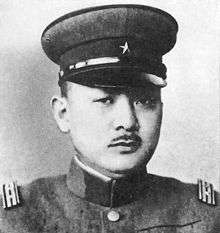
General Tadamichi Kuribayashi, the overall commander of the Japanese forces during the Battle of Iwo Jima, was a poet and former diplomat who had been assigned to Washington, D.C. during the Interwar Period. Having seen America's military and industrial power first hand, Kuribayashi opposed Prime Minister Hideki Tojo's decision to attack Pearl Harbor, saying, "The United States is the last country in the world Japan should fight." It was ultimately decided to assign Kuribayashi to the suicide mission of defending Iwo Jima in order to silence his criticisms of the war.
On 17 March 1945, the General sent his farewell message to Imperial Headquarters accompanied by three traditional death poems in waka form. Both were, according to historian Kumiko Kakehashi, "a subtle protest against the military command that so casually sent men out to die."[75]
Unable to complete this heavy task for our country
Arrows and bullets all spent, so sad we fall.
But unless I smite the enemy,
My body cannot rot in the field.
Yea, I shall be born again seven times
And grasp the sword in my hand.
When ugly weeds cover this island,
My sole thought shall be the Imperial Land.[76]
The poems and the message were heavily rewritten by Japanese military censors before being published and all anti-war sentiments were removed. Instead of describing the General and his soldiers as feeling "sad" to fall in battle, Japanese censors rewrote the poem to say that they died in Banzai charges, which the General had forbidden on Iwo Jima as an unnecessary waste of his men's lives. The uncensored text of both the message and the poems were only published after the Surrender of Japan.
Serbia
Amongst Serbian poets during World War II, the most notable is Desanka Maksimović. She is well-known for "Krvava bajka" or "Bloody Fairy Story". The poem is about a group of schoolchildren who fell victim to the Nazis in 1941 in Kragujevac massacre.[77]
Later wars
American poets
The Korean War produced the American war poets Rolando Hinojosa and William Wantling. [78]
The Vietnam war also produced war poets, including Michael Casey whose début collection, Obscenities, drew on his work as military police officer in Vietnam's Quang Nga province. The book won the 1972 Yale Younger Poets Award. Other prominent Vietnam War poets include W. D. Ehrhart, Yusef Komunyakaa, and Bruce Weigl.[79]
At the height of the Vietnam War in 1967, American poet Richard Wilbur composed A Miltonic Sonnet for Mr. Johnson on His Refusal of Peter Hurd's Official Portrait. In a clear cut case of "criticism from the Right", Wilbur compares U.S. President Lyndon Baines Johnson with Thomas Jefferson and finds the former to be greatly wanting. Commenting that Jefferson "would have wept to see small nations dread/ The imposition of our cattle brand," and that in Jefferson's term, "no army's blood was shed", Wilbur urges President Johnson to seriously consider how history will judge him and his Administration.
Most recently, the Iraq War has produced war poets including Brian Turner whose début collection, Here, Bullet, is based on his experience as an infantry team leader with the 3rd Stryker Brigade Combat Team from November 2003 until November 2004 in Iraq. The book won numerous awards including the 2005 Beatrice Hawley Award, the 2006 Maine Literary Award in Poetry, and the 2006 Northern California Book Award in Poetry.[80][81] The book also was an Editor's Choice in The New York Times and received significant attention from the press including reviews and notices on NPR and in The New Yorker, The Global and Mail, and the Library Journal. In The New Yorker, Dana Goodyear wrote that, "As a war poet, [Brian Turner] sidesteps the classic distinction between romance and irony, opting instead for the surreal."[82]
Rob Jacques, a Vietnam-Era Navy veteran, has explored the tension between love and violence in war from the perspective of gay servicemen in his collection, War Poet, published by Sibling Rivalry Press.[83]
In popular culture
- The Welsh language anti-war biopic Hedd Wyn was released in 1992. The film, which stars Huw Garmon as the Welsh war poet Hedd Wyn, is based on a screenplay by Alan Llwyd. It depicts the protagonist as a tragic hero who has an intense dislike of the wartime ultranationalism which surrounds him and focuses on his doomed struggle to avoid conscription into the British Army during World War I. Hedd Wyn won the Royal Television Society's Television Award for Best Single Drama. It also became the first British motion picture to be nominated for Best Foreign Language Film at the 66th Academy Awards in 1993.[84]
- The 1997 film Regeneration focuses on the stay of English war poets Siegfried Sassoon and Wilfred Owen at Craiglockart War Hospital, where Sassoon had been incarcerated for criticizing the British Government for refusing to put an end to World War I.
See also
References
- "war poet noun" The Oxford Dictionary of English (revised edition). Ed. Catherine Soanes and Angus Stevenson. Oxford University Press, 2005
- Herwegh, Georg, The Columbia Encyclopedia (2008)
- The Times, Southern Germany, 29 September 1848
- Alfred Lord Tennyson, Poems, ed. Hallam Lord Tennyson and annotated by Alfred Lord Tennyson (London: Macmillan, 1908), II, 369.
- Brighton, Terry (2005), Hell Riders: The True Story of the Charge of the Light Brigade, Penguin
- Callow, 283
- Callow, 293
- Carrington, C. E., (1955) The life of Rudyard Kipling, Doubleday & Co., Garden City, NY, p. 236
- Craig Raine (ed.), Kipling, Selected Poetry (Penguin, 1992), pp. 214–215
- Poetry of the Boer War, St Andrew's University
- Time's Laughingstocks and Other Verses (London: Macmillan, 1909)
- Dana Gioia, John Allan Wyeth: Soldier Poet, St Austin Review, March/April 2020. Page 4.
- Axelrod, Jeremy. "Thomas Hardy". The Poetry Foundation. Retrieved 2014-05-19.
- Katherine Kearney Maynard, Thomas Hardy's Tragic Poetry: The Lyrics and The Dynasts. Iowa City: University of Iowa Press, 1991, pp. 8–12.
- Gilmour, David, The Long Recessional: The Imperial Life of Rudyard Kipling, London: Farrar, Straus and Giroux, 2002
- Richard Perceval Graves, ‘Graves, Robert von Ranke (1895–1985)’, Oxford Dictionary of National Biography, Oxford University Press, 2004
- The Georgian Revolt, p. 166.
- Dilworth, Thomas. Reading David Jones. Cardiff: University of W Wales, 2008, p. 1; Dilworth, Thomas. The Shape of Meaning in the Poetry of David Jones. Toronto: University of Toronto Press, 1988; Eliot, T.S. "A note of introduction," In Parenthesis. By David Jones. London: Faber, 1961, vii.
- Westminster Abbey: Poets of the First World War
- Ronald Black (199), An Tuil: Anthology of 20th Century Scottish Gaelic Verse, Polygon. Pages 748-749.
- Ronald Black (199), An Tuil: Anthology of 20th Century Scottish Gaelic Verse, Polygon. Pages 747-748.
- "The Great War: Part 1 - Transcript". American Experience. PBS. 3 July 2018. Retrieved 7 May 2019.
- Friedman, Dick (2016-10-05). "Alan Seeger". Harvard Magazine. Retrieved 2019-09-18.
- Seeger, Alan (1917). Letters and Diary of Alan Seeger. New York: Charles Scribner's Sons. p. 214-215, 218.
alan seeger.
- Dana Gioia, John Allan Wyeth: Soldier Poet, St Austin Review, March/April 2020. Page 4.
- Dana Gioia, John Allan Wyeth: Soldier Poet, St Austin Review, March/April 2020. Page 5.
- Tim Cross (1988), page 42.
- Tim Cross (1988), The Lost Voices of World War I, page 41.
- Jim Haughey, The First World War in Irish Poetry, Bucknell University Press, 2002, p. 102
- E. Longley, "Ledwidge, Francis Edward (1887–1917)" : Oxford Dictionary of National Biography, Oxford University Press, (2004), vol. 33, pp. 45–46.
- Jeffares,Alexander Norman.A Commentary on the Collected Poems of W.B. Yeats.Stanford University Press (1968) p. 189
- Yeats, William Butler. qtd. in A Commentary on the Collected Poems of W.B. Yeatsby Norman Alexander Jeffares. Stanford University Press (1968) p. 189
- Haughey, Jim. The First World War in Irish Poetry Bucknell University Press (2002) p. 162
- Ray Burke, "Challenge to official accounts of Gregory death in WWI," 2 January 2018, RTÉ News Now, https://www.rte.ie/news/analysis-and-comment/2018/0101/930446-robert-gregory/
- Foster 2001 pp. 68–69
- Haughey, Jim (2002). The First World War in Irish Poetry. Bucknell University Press. p. 161. ISBN 9781611481518.
- Deane, Seamus (1998). "Boredom and Apocalypse". Strange Country: Modernity and Nationhood in Irish Writing Since 1790. Clarendon lectures in English literature. Clarendon Press. p. 179. ISBN 9780198184904.
- Albright, Daniel. "Quantum Poetics: Yeats's figures as reflections in Water", Cambridge University Press (1997), p. 35.
- R.R. Milner-Gulland in A.K. Thorlby (ed.), The Penguin Companion to Literature: European (Penguin, 1969), p. 762.
- Tim Cross(1988), The Lost Voices of World War I, page 81.
- Patrick Bridgwater (1985), The German Poets of the First World War, page 96.
- Patrick Bridgwater (1985), The German Poets of the First World War, page 100.
- Patrick Bridgwater (1985), The German Poets of the First World War, page 97.
- Patrick Bridgwater (1985), The German Poets of the First World War, page 97.
- Patrick Bridgwater (1985), The German Poets of the First World War, page 96.
- Tim Cross (1988), The Lost Voices of World War I, page 109.
- Tim Cross (1988), The Lost Voices of World War I, page 118.
- Tim Cross (1988), The Lost Voices of World War I, page 349.
- Erika Papp Faber (2012), A Sampler of Hungarian Poetry, Romanika Kiadó, Budapest. Page 120.
- Erika Papp Faber (2012), A Sampler of Hungarian Poetry, Romanika Kiadó, Budapest. Page 120.
- Erika Papp Faber (2012), A Sampler of Hungarian Poetry, Romanika Kiadó, Budapest. Pages 120-121.
- Tim Cross (1988), The Lost Voices of World War I, pages 349-350.
- Erika Papp Faber (2012), A Sampler of Hungarian Poetry, Romanika Kiadó, Budapest. Pages 124-125.
- Luković, Suzana. "VELIKI SRPSKI PESNICI U VELIKOM RATU Prešao je preko Albanije, radio kao srpski obaveštajac i ovekovečio sahrane srpskih mladića u BESMRTNOJ PESMI". Blic.rs (in Serbian). Retrieved 2019-07-25.
- The Penguin Book of Spanish Civil War Verse, edited by Valentine Cunningham (Penguin, 1980); see also War Poets Association: Spanish War
- Poems from Spain: British and Irish International Brigaders of the Spanish Civil War in Verse, edited by Jim Jump. (London: Lawrence & Wishart, 2006)
- A Líster, jefe en los ejércitos del Ebro, Antonio Machado, June 1938.
- Tarn (1975) p. 16
- Blythe, Ronald (1966). Components of the Scene. Harmondsworth: Penguin.
- London Review; Andrew Sinclair, The War Decade: An Anthology Of The 1940s. London; Hamish Hamilton. ISBN 0241125677 (p. 47)
- Press, John (1 March 1994). "Poets of World War II". In Scott-Kilvert, Ian (ed.). British Writers: 007. New York: Charles Scribner's Sons. pp. 422–423. ISBN 978-0684166384. Retrieved 25 May 2015.
- Ronald Black (1999), An Tuil: Anthology of 20th Century Scottish Gaelic Verse, page 727.
- Scannell, Vernon Not Without Glory Woburn Press , London 1976 ISBN 0713000945
- Gilroy, Harry. "Poets Honor Memory of Jarrell at Yale." The New York Times 1 March 1966.
- Martin (2007) p. 10
- Davies, Norman (1982) God's Playground. A History of Poland, Columbia University Press, Vol. II, ISBN 0-231-12819-3
- Proffer, Carl R. (7 August 1977). "Russia in Prussia". The New York Times. Retrieved 18 June 2017.
- e.g. translation by Jerome Rothenburg at poets.org website, accessed 1 July 2014
- e.g. translation by Christopher Middleton at poets.org, accessed 1 July 2014.
- "Paul Celan", in poets.org website, accessed 1 July 2014; Duroche (1967), p. 472.
- Glenn (1972), p. 25.
- Voices of Education, "WWII Japanese Poets
- Voices of Education, "WWII Japanese Poets
- Kumiko Kakehashi, So Sad to Fall in Battle: An Account of War, page xxv.
- Kumiko Kakehashi, So Sad to Fall in Battle: An Account of War, page xxiii.
- "Krvava bajka - Serbo-Croatian Poetry Translation". sites.google.com. Retrieved 2019-07-25.
- W. D. Ehrhart, The Madness of It All: Essays in War, Literature and American Life, (Jefferson, NC: McFarland & Company, 2002) pp. 141–172.
- Unaccustomed Mercy: Soldier-Poets of the Vietnam War, edited by W. D. Ehrhart. (Lubbock, Texas: Texas Tech University Press, 1989)
- Lorraine Ash, A Poet Goes to War, September 17, 2006
- Book Publisher's Site Info on Book
- New Yorker Article
- Jacques, Rob (2017). War Poet. Sibling Rivalry Press. ISBN 978-1-943977-29-1.
- "The BFI: Hedd Wyn (1992)". British Film Institute website. British Film Institute. 2017. Retrieved 5 January 2017.
Bibliography
- O'Prey, Paul (ed). First World War: Poems from the Front (Imperial War Museum, 2014) ISBN 9781904897880
- Silkin, Jon. Out of Battle: The Poetry of the Great War. Basingstoke: Palgrave Macmillan, 1972. Rpt. 1998. ISBN 978-0-312-21404-3.
- Roy, Pinaki. The Scarlet Critique: A Critical Anthology of War Poetry. New Delhi: Sarup Book Publishers Pvt. Ltd., 2010. ISBN 978-81-7625-991-0.
- Ghosal, Sukriti. War Poetry - The New Sensibilities. Kindle Edition, 2015. ASIN: B00XH4O74Q. https://www.amazon.com/War-Poetry-The-New-Sensibilities-ebook/dp/B00XH4O74Q.
External links
- BBudgen, David: Literature (Version 1.1), in: 1914-1918-online. International Encyclopedia of the First World War.
- Poetry of the Boer War, St Andrew's University
- Japanese War poets
- Potter, Jane: Literature (Great Britain and Ireland) , in: 1914-1918-online. International Encyclopedia of the First World War.
- Whalan, Mark: Literature (USA) , in: 1914-1918-online. International Encyclopedia of the First World War.
- A selection of Boer War poems
- War Poems From Iraq
- War Poets Association
- The First World War Poetry Digital Archive
- Pro Patria (1917) by Philadelphia poet Florence Earle Coates (1850–1927) pamphlet of poems in support of American involvement in WW1
- Dean F. Echenberg War Poetry Collection at the Ransom Center, University of Texas, Austin. Over 7000 volumes of War Poetry

